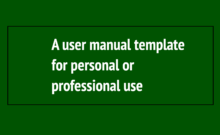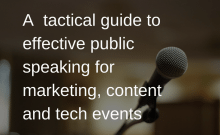In the digital age, your personal brand is defined by your reputation (online and offline), your online profile and the content you share. By making it a habit to create and/or share best-in-class content and showing empathy by helping others do better at their jobs or businesses, you’re ensuring your personal brand becomes respected and sought after by prospects and customers. However, if your brand cannot rise to the occasion, expect to get left behind in the never-ending quest for attention, engagement and collaboration.
Table of Contents
Branding is not optional.
When I worked for ESPN, one of my closest friends always teased me about how often I used “wow” in conversation. He once overheard a conversation between me and the CEO of a multi-billion-dollar company, whom I asked, “How often do you get out on the lake with your family?” The executive said, “Not very often now. I’m too busy.”
My response?
“Wow.” (I was too engrossed in staring at interview notes on my iPhone.) As you can imagine, I never lived it down, with my friend calling my frequent use of the word a Ronellism.
Needless to say, this way not the personal brand I hoped to establish. However, this quirk did highlight an element of my personality that is core to my personal brand: an unwillingness to take myself too seriously. In personal and professional interactions, I strive to focus intently on the person I’m talking to instead of being distracted by anything ongoing around us.
Therefore, a major tenet of my personal brand is being seen as someone who made people feel like they were important and who listened intently when they were talking, which conveyed that what they had to say was meaningful and valuable.
Brand building is a natural extension of who you are and what you do.
When most of us hear or see the word branding, we think of the tacky, smarmy online personalities who seemingly exist to hawk their cheesy wares or to sell the public their preposterously nonsensical personas to whichever brand will pay them. We are all similarly repulsed. But while we can blame these hucksters for tainting our opinion of branding, we only have ourselves to blame for not fully recognizing the true value, significance and importance of personal branding.
Personal branding is invaluable for small business owners, in large part because customers who feel a connectedness to you and your business are more likely to return frequently. It’s not enough that you provide a great product or service; you must strive to own space in the minds of your customers, ensuring that they think of you when the need arises for your product or service. This ensures that your friends, colleagues, and coworkers respect your work and you attain a level of recognition in your respective industry.
We must also highlight that expertise through making a sincere investment in the success of others while sharing content, particularly online content, that enables us to get found by people who don’t know us but who might benefit from our work. The entirety of the process can seem overwhelming, but that’s only because we make it so. Personal branding is really about one thing: becoming the definitive resource for a particular service or area of business.

Your goal must be to become the brand that’s called to mind when people need ‘X’.
Let’s play a little word association.
- Organic search: Google
- Technology: Apple
- E-commerce: Amazon
Your goal as a personal brand is to enjoy the same top-of-mind status. (For those of you wondering, “What about my business? That’s what I want to rank/be found in search/be known for,” remember, people connect with people first. You need subject matter experts on deck to gain recognition for the brand. Without them, you’ll have a faceless entity that’s much tougher to connect with and through.
How I learned the value of personal branding
Before I share how I typically advise business owners to go about personal branding, I’ll share a little about me that helps tie it all together. Before becoming a digital marketer, I worked for years in the outdoor industry—shooting sports, hunting, and the $28 billion sportfishing industry—first as a writer, then as a B2B editor, and later as a consultant to sporting goods retailers and various other SMBs hoping to get involved in the outdoor industry.
By the time I became a consultant, I was viewed as an expert in my field, being called on to help with everything from distribution and sales channels to PR, marketing, ad-buying, branding, media relations, content writing, business strategy and web design. I loved it. But I wanted more.
I didn’t want to be pigeonholed as “the guy who knows the outdoor industry like the back of his hand.” I wanted to be a broader business strategist, one who specialized in digital content but who was not defined by it. So, in 2012, I took the leap, deploying the strategy I’d laid out many times over many years for clients, prospects and friends.
I’m happy with the results, but rebranding has proved to be a lot like what they say about turning a ship: a very slow, deliberate process.
How to develop a strong personal brand
“What do you want your brand to be known for?” That’s the question I ask anyone looking to establish or refine their personal brand. Then, I give them some homework.
Spend some time focusing on your abilities, talents, strengths, then use those elements to fashion some long-term goals of where you’d like to be at a certain point in the future. Be mindful, however, that pragmatism is a must. You cannot be anything you want to be, despite what some talking heads will have you believe, so look closely at what you want to be juxtaposed against and what you are willing to work for and could feasibly attain.
Think of specializing in an area where there are few players, thus providing you with a greater chance of being successful since there won’t be as much competition. However, be careful not to specialize too soon or in an area that lacks competition primarily because there is no real need for the service.
Once you have some clarity, create a website and begin sharing content, making certain to promote it via social media, in addition to featuring an email subscriber signup on the site.
The three tips below will help you use social proof to enhance your personal brand:
- Solicit testimonials from current or past clients (or even friends who know your work) and use them on your website, particularly via the homepage. (Make certain to use an image of the person being quoted; doing so humanizes the testimonial.)
- Collaborate with an expert in your field to create a piece of content. It could be a podcast, interview or a funny video. You can share the content on your site and via social media, creating authority by association in the process.
- Create a guest post for an industry-leading blog or publication; doing so provides you with recognition and the ability to showcase the logo of the blog/publication on your site.
Find the places where information on your topical area is being shared, conversed about and linked to.
Hopefully, if you’re publishing a blog, you’ve identified people, communities and platforms where you can share your content and become an active, visible part of the community. Your goal with regard to being apart of these communities, whether on social media, forums, discussion boards or blogs, is sincere engagement.
Make yourself memorable by freely interacting and sharing others’ content without regard for how it benefits you immediately. Strive to be one of the first people to comment on relevant blog posts, then seek to be the most informative answer to any questions that might be asked. (Note: Facebook groups are ideal for this. They are a lot less noisy places than typical Facebook pages; they also are where experts in respective fields convene and share ideas.)
The overarching goal is to become seen as an expert who consistently offers indispensable information. I know a lot of attention is being given to the need to make yourself useful to create top-of-mind awareness, and I largely agree. (Don’t try to be a know-it-all or a blabbermouth; simply create a cadence of checking into the forum or group or page and adding where appropriate.)
But riddle me this: When we have far more things to get done than we’ll ever be able to complete, who will you seek out for answers when questions crop up? The indispensable expert or the useful resource, assuming both are accessible? Indispensable beats useful every time.
Focus on sharing content with more depth than breadth.
When you first start sharing content, there will be a temptation to write and converse about everything under the sun. That’s understandable, given that you are a person of diverse interests. However, on your website and in the digital spaces where you hope to make a name for yourself in the area of “X,” focus your content around the topics you hope to be known for.
Doing so helps with topical relevance for your website, makes it easier for people who don’t know you to perceive who you are, what you do and accurately gauge the quality of your work.
Most important, focusing your content narrowly means you can hone your ability to consistently produce content depth, which is a must if you wish to be seen as the top of the food chain in your respective area.
I developed the “always-be-branding” mindset after talking to executives who, despite having well paid, high-profile jobs, were looking at life beyond corporate America, which likely entailed them doing their own thing as an entrepreneur. They were successful in their current domain, but the world they were stepping into was new and scary.
“Always be branding” was my way of saying, “In the digital space, you’re either defining your position or having someone define and dictate it for you. Better that you manage your own future.”
These people—like you—must take into account that the folks who could and would hire them will be judging them not by the work they do, per se, but by their online personas, including the information they share and the communities they’re a part of.
Create and curate to build your personal brand.
Remember, a strong brand isn’t a nice-to-have; it opens doors for your brand. Businesses want to know that the person they’re looking to work with has a strong reputation for quality work and is respected in the field. Also, as a bonus, you don’t have to create all, or even most, of the content you share. Research shows that people often don’t pay as much attention to the name of the person who created the work as they do the name of the person who shares it.
This is important, for it means you can develop a content sharing cadence that supersedes your own ability to create content. For example, more than 80% of the content I share is curated from expert sources I know and trust. You can do the same. Find your community online, engage with them and become an invaluable member of the community.
What about you? Are you ready to “always be branding”? If not, it’s time to come to grips with the fact that personal branding is invaluable for your success online.





